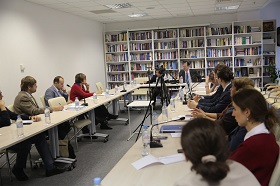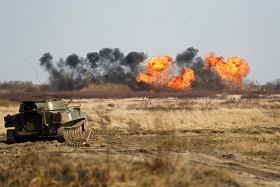The RIAC editorial team recently sat down with Ian Bond, Director of Foreign Policy at the Centre for European Reform. Bond is an expert in Russia and the former Soviet Union, European foreign policy, as well as Europe/Asia relations and US foreign policy. In this interview, RIAC gets Bond’s take on current political developments in and around the EU and what such developments mean for the future of Europe.
The RIAC editorial team recently sat down with Ian Bond, Director of Foreign Policy at the Centre for European Reform. Bond is an expert in Russia and the former Soviet Union, European foreign policy, as well as Europe/Asia relations and US foreign policy. In this interview, RIAC gets Bond’s take on current political developments in and around the EU and what such developments mean for the future of Europe.
How do you see the EU without the UK in the near future?
I think politically the UK is a very active player in EU foreign policy and the EU risks becoming a more passive actor in the international arena without the UK, losing interest in issues outside of Europe. If you look at some of the areas where the UK, in a sense, became active in predominantly EU-engaged areas, like Somalia, the Horn of Africa or Zimbabwe, there has been less activity from the EU acting independently from the UK. I think that globally, the UK leaving the EU will be a loss. In regard to the economy, the EU has become a more economically liberal organization with the development of a single market over the last 30 years. And I expect that to continue. Despite that, I think there will be some changes, for example, in the area of competition. There will probably be more support for European champions and large corporations to be more creative so that they can compete with Chinese mega-corporations. Whereas I think that in the UK they have always said that we need to have open markets and not favor the creation of European champions, let the market decide, who is the champion and who isn’t.
Recently, Turkey launched military operations in northern Syria. In your opinion, how does the EU see Turkey’s actions in Syria?
I think this will raise a lot of questions for the EU. First of all, Turkey is talking about returning a lot of refugees to some sort of the “safe zone”. What will become of that safe-zone? If Turkey starts to return refugees against the advice or will of the UN High Commissioner for Refugees (UNHCR), that could be extremely problematic and make it very difficult for the EU to continue cooperating with Turkey on migration and refugee issues. So there will be a lot of concern about that and the regional destabilization it might cause. And, of course, issues will arise concerning many former Islamic State fighters and their families in the areas currently controlled by the Kurds, being guarded and kept under a certain level of control by Kurdish security personnel. Anything which leads to those people being able to escape and move around freely, potentially travelling to Europe, is extremely problematic for the EU. So I think the EU is dealing with a lot of uncertainty as to what's going to happen in northern Syria.
Trump recently said that ISIS fighters might start escaping to Europe. What is the main approach of the EU to ISIS fighters, especially those who are EU citizens? Should they be deprived of their citizenship?
This is a national question in the EU and it is important to underline that. I suspect that different countries will take different approaches to this matter. I know the UK has already revoked the citizenship of a number of British nationals who had traveled to the region, but as far as I'm aware, only of people who had some other citizenship. It is normally contrary to British practice, possibly even to British law, to make someone stateless by taking away British nationality. However, if you are a British Canadian or a British Bangladeshi national, then the law allows you to be denied British citizenship and retain only the citizinship you were born with. Even so, other countries will have other sets of rules and there will be different levels of readiness to deal with returning jihadists in terms of security and the criminal offenses they can be charged with. There are many questions like this that the EU is competent to deal with, although one might say there is a need for discussion at the EU level about a common approach to some of these matters.
The Council of Europe recently voted to reinstate Russia’s membership of the Parliamentary Assembly. Doyou view this as a sign that the EU is ready for dialogue with Russia?
I think the EU is always open to dialogue with Russia, but it all depends on the terms. Within the EU, the decision of the Parliamentary Assembly remains quite controversial. There are a number of countries that feel that the conditions that led to Russia's suspension have not changed. What has changed though is the financial position of the Council of Europe. Russia needs to pay its membership fee and if Russia is suspended and doesn’t pay such a fee, the financial picture becomes quite cloudy for the Council. Whether or not that's a good reason for taking these measures is disputable. I think some countries in the EU will probably say that it’s not worth doing. In terms of broader dialogue, we never suspended cooperation in all areas, with sanctions actually being rather narrow and limited. Although high-level dialogue was partially suspended, a number of areas where actual discussions continued remained. For example, issues of product standards and issues to do with technology, which matter to the two communities on both sides of the border between the EU and Russia. In the international context, the official position of EU member states involved in Iranian nuclear negotiations are closer to the Russian position than that of the US. Nonetheless, there are some big, difficult issues largely focused on Ukraine, on the Skripal case and on some of the activities of Russian intelligence services in the West. Those are difficult issues, but there are also a number of areas where we still have things we can and have to talk about.
Recently Bloomberg reported that the US is weighing China’s currency pact as a part of the partial trade deal. How does the EU regard that?
There is a paradox in the American approach that, on one hand, the US is in favor of free markets, but on the other hand, they're not in favor of the Yuan moving in accordance with market forces. Some of the things Donald Trump has done has led to the dollar rising and the Yuan falling, making Chinese goods even more competitive on the American market. So I don’t believe the US forcing China to keep the Yuan artificially expensive is a long-term phenomenon.






